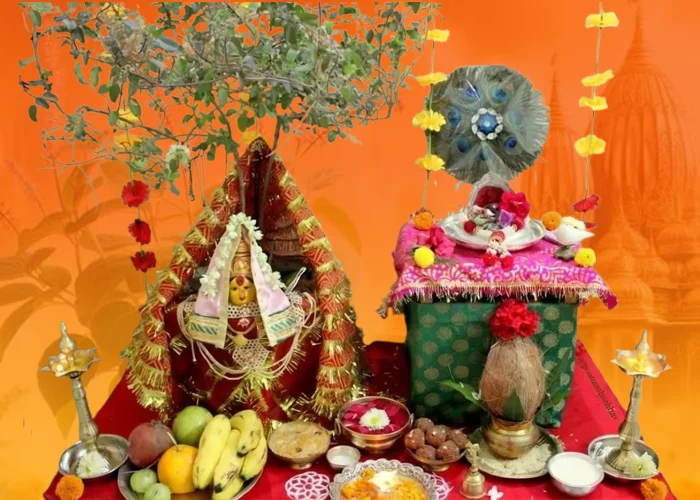







 How it Works
How it Works


Select Your Puja on Preferred date

Fill your Name, Gotra and Address

Your puja will be performed in the temple

You can watch puja video along with your sankalp timing

Your prasad will be delivered within 7–10 days after puja
 How it Works
How it Works











 4 Ways to Participate
4 Ways to Participate

.webp)
.webp)
.webp)
.webp)
.webp)
.webp)
.webp)
.webp)
.webp)
 About Puja
About Puja

Tulsi Vivah Puja marks the ceremonial marriage of Goddess Tulsi (holy basil, regarded as an incarnation of Maa Lakshmi) with Lord Vishnu in the form of Shaligram. Observed Kartik Shukla Dwadashi, it symbolizes the end of Chaturmas and the beginning of the auspicious wedding season. Devotees perform the ritual to invite prosperity, harmony, and divine grace into their homes. The puja begins with purifying the space, decorating the Tulsi vrindavan, and placing a Shaligram or Vishnu idol beside the plant. After sankalp, the couple is “wedded” with traditional items—mangal sutra, sindoor, haldi-kumkum, flowers, sugarcane or banana stems as mandap, and a small kanyadaan ritual. Archana with Tulsi leaves, Vishnu Sahasranama, and Tulsi aarti completes the ceremony, followed by prasad and charity. Spiritually, Tulsi Vivah is believed to remove obstacles to marriage, bless couples with mutual understanding, support those seeking good alliances, and promote household prosperity (grihasthya shri). It also cultivates sattva—purity, discipline, and devotion—by aligning daily life with dharma. Observing simple vrat and offering sattvic food enhances the merit of the day. Families may perform it at home or temple, ensuring the Tulsi plant is healthy and well cared for. With devotion and humility, Tulsi Vivah transforms the home into a sanctified space of blessings, gratitude, and sacred partnership.
 About Temple
About Temple

Tulsi Manas Temple in Varanasi is a serene shrine dedicated to Lord Rama, revered as the place where the poet-saint Goswami Tulsidas is believed to have composed the “Ramcharitmanas” in the 16th century. The present marble temple, built in 1964 by the Birla family near Durga Kund, is famed for its white stone walls intricately engraved with couplets (dohas and chaupais) from the epic. The sanctum houses graceful idols of Shri Ram, Sita, Lakshman, and Hanuman, while the surrounding halls and corridors depict key episodes from the Ramayana through sculpted panels and diorama-style displays that help visitors—devotees and students alike—trace the story in an accessible way. Regular recitations, bhajans, and morning–evening aarti sustain a contemplative atmosphere, making it a favorite spot for quiet prayer as well as literary appreciation. Festivals such as Ram Navami and Dussehra draw larger gatherings, yet the temple retains an intimate, study-friendly feel, with gardens and a modest museum enhancing the experience. For many pilgrims, Tulsi Manas Temple bridges scripture and lived devotion: it celebrates the moment when the Ramayana was rendered in the people’s language, inviting every visitor to engage directly with its teachings of dharma, compassion, and steadfast faith.
 Benefits of Puja
Benefits of Puja


Tulsi Vivah symbolizes the sacred marriage of Tulsi and Lord Vishnu, harmonizing earthly life with divine order. Performing this puja invites grace, stabilizes household energies, and marks the transition to auspicious wedding season. Devotees receive blessings for righteous partnerships, livelihoods, and steady minds while aligning intentions with dharma and bhakti.

Couples praying during Tulsi Vivah cultivate respect, patience, and forgiveness. The ritual pacifies Mars-related conflicts, softens ego clashes, and supports stable marriages. Families seeking alliances experience smoother negotiations and fewer obstacles. The puja nurtures emotional safety, strengthens communication, and builds shared values needed for enduring companionship and joyful domestic life.

Offering naivedya, lamps, and kanyadaan to Tulsi during Vivah pleases Lakshmi-Narayana. It is believed to attract prosperity, curb unnecessary expenses, and open opportunities for income. Households experience orderly finances, supportive mentors, and fruitful collaborations. The merit encourages gratitude, disciplined charity, and a wealth outlook rooted in contentment rather than anxiety.

Tulsi is revered for sattvic fragrance and purifying qualities. Tulsi Vivah worship, parikrama, and mantra-japa elevate prana, reducing negativity and fear. Homes feel lighter, kitchens become more mindful, and routines stabilize. Devotees seek relief from ailments, protection from infections, and balanced lifestyles through cleaner habits, simple food, rest, and prayer.

Performing Tulsi Vivah with shraddha and daan is considered pleasing to ancestors. The merit supports resolution of family tensions and mitigates Pitru dosha symptoms. One seeks clarity in inheritance matters and peaceful closure in old grievances. Regular remembrance transforms guilt into service, guiding families toward responsibility, harmony, and intergenerational blessings.

Devotees take sankalpa before Tulsi Vivah for righteous desires—education, livelihood, children’s progress, or smooth ceremonies. Bhajans, kirtan, and reading Vishnu-kathe inspire inner discipline. The ritual redirects ambition toward purposeful work and seva. Wishes ripen patiently and steadily as effort, ethics, and grace converge, deepening trust in divine timing and perseverance.

Caring for the Tulsi plant after Vivah sustains results. Watering, lighting a lamp, and mindful pruning build daily devotion. Homes gain fresher air and a peaceful courtyard. Children learn reverence for nature, seasonal rhythms, and vegetarian simplicity. The practice encourages less waste, compassionate kitchens, and an environmentally responsible, sattvic lifestyle.
 Devotee Corner
Devotee Corner


Mujhe ye Pooja karakar accha laga inhone acche se kiya aur mujhe bhaut accha laga aap bhi ye Pooja try kar sakte ho

घर बैठे इतनी सुंदर पूजा में शामिल होना Bhaktimay की वजह से संभव हुआ 🛕📿। सच में, मन को शांति मिली 🙏💛। Bhaktimay की ऑनलाइन पूजा सेवा ने दिल जीत लिया 🌸✨। बहुत अच्छी व्यवस्था और सच्ची श्रद्धा 🙏😊।

Liked the fact that we can book Puja online with Bhaktimay, saving the effort of traveling for everything. Felt very nice to hear my name and gotra during the Puja. Prasad was also received on time, making the whole experience complete and satisfying.

अच्छा लगा पूजा करके, मन को शांति महसुस हुई। आज प्रसाद भी मिला, देवी मां का आशीर्वाद एवं दृष्टि सदा बनी रहे

Grateful to Bhaktimay for a divine online Puja experience — felt truly blessed and connected from home!

I really like the whole process of Puja at Bhaktimay. Puja is conducted properly, and customer support is available throughout the process. I asked questions to the team, and they resolved all my queries with patience. Most genuine and authentic experience.
 FAQs
FAQs


 Subscribe
Subscribe

If you are interested in Upcoming Pujas, Offerings, Divine products and sanatan dharma, you can choose to subscribe Bhaktimay Whatsapp
 Chat on Whatsapp
Chat on Whatsapp
© 2025 Bhaktimay | With Devotion from the Heart of Bharat 🇮🇳